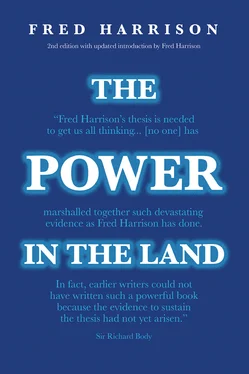1 ...7 8 9 11 12 13 ...21 The only way of eliminating monopoly power in the land market is to compel owners to compete with each other on a continuous basis. The only efficient method of accomplishing this is to impose an annual tax on the value of all land that is capable of yielding rental income. Owners would thus be obliged to put their land to good use, within the framework of existing social and economic needs, and legal constraints (e.g., zoning). By doing so, they would acquire an income out of which to pay their tax dues.
Thus, they would not be able to hold valuable land vacant. Sites that were needed for recreation, housing, industry, commerce, and so on, would be released, thereby removing the eye-sores of derelict sites in the middle of our great cities. This ad valorem tax, which becomes a cost on the right to possess and use land, effectively neutralizes the power of the monopolist to withhold it from use for no better reason than the wish to cash in — at some future date — on the needs of society for a finite resource. It would, furthermore, remove the temptation to force rents above the realistic levels made possible by the best current uses (hope values, as they are known).
Not only would the tax have a dynamic impact on the land market per se, but it would also generate a higher level of activity generally. For the tax ought not to be an additional one, but ought to be a substitute for existing taxes. Indirectly, therefore, the land value tax would smooth out the kinks in the labour and capital markets — imperfections which, as we shall see, were in the main originally generated by land monopoly — thereby extending its benefits throughout the economy.
Before this fiscal reform can be introduced, however, legal titles have to be registered and a survey of values undertaken. The Domesday Book is an example of such an exercise. An up-to-date public register of titles facilitates the transfer of land, for it reduces the legal and administrative costs of checking the legitimacy of titles every time a site changes hands. Lawyers have traditionally opposed the registration of titles in Britain. William Petty, in noting the prosperity of Holland in the 17th century (a prosperity which, we venture to suggest, had something to do with the land tax, the administration of which Adam Smith deprecated), pointed to the importance of that country’s register of titles to land. Proposals to introduce registers in England, he said, were stridently opposed by the legal profession. 7 Today, there is public access to title documents in Scotland, but not in England and Wales. In the US, they are scattered throughout the nation, in records offices that make a systematic collation and examination difficult.
Landowners, of course, have been in the vanguard of the opposition to the orderly institutionalisation of land (beyond the minimum system required to guarantee recognition of legal titles). An open register of titles, incorporating details of acreage and value, would make the owners vulnerable to taxation. The absence of hard data made it difficult for the post-medieval bureaucracy to collect land taxes systematically and on a permanent basis. The landed class which controlled Parliament made sure that the land tax (which did not fall exclusively on economic rent) was a fluctuating one. In the main, it was raised during times of war. 8 This was acceptable because it identified landowners with a patriotic cause and at the same time set limits to the extent and duration of the tax.
By contrast, data on the employment of labour is carefully monitored. Statistics are regularly published on the numbers out of work, regional variations, and the trends in job vacancies. Industrialists are regularly surveyed to establish the utilisation levels of their capital equipment and their investment intentions. No such concern is expressed about the use of land.
The waste of valuable land has reached crisis proportions in the Western world, yet governments refuse to establish the extent of the problem. The cavalier way in which the land market is treated by the politicians can be illuminated by the British experience. In 1976 the Labour Government’s Secretary of State for the Environment (Peter Shore) declined to establish the amount of publicly-owned vacant land on the grounds of disproportionate cost. 9 His successor in Margaret Thatcher’s Conservative Government (Michael Heseltine) reversed the cost calculations, and ordered local governments to create registers of publicly-owned vacant land; but he declined to take similar action to register privately-owned vacant land.
As a result of the nebulous attitudes of the politicians, the exercise in quantification is left to under-financed scholars 10 and private organisations which feel an intuitive concern. One of these, the Civic Trust, exists to arouse pride in the appearance of towns in Britain. Apart from the 137,000 acres in England and Wales which were officially classified as derelict (1977), the Trust estimated that 250,000 acres were ‘dormant’. Their report 11 is an indictment of land use; but while a dramatic case was made out in relation to the visual appearance of neglected sites in the cities, the effect on gross national product could not be calculated because the extent of the problem is impossible to judge without a latter-date Domesday Book survey. And it is now more than 100 years since the last official study into the ownership and value of land has been conducted ( Return of Owners of Land in England and Wales, 1873). 12
The economic effects of the veil of secrecy that shrouds the land market have serious political implications. The power wielded by the land monopolist in his various guises is enormous, is growing rapidly and under-going important transformations. Before the Second World War there were practically no property companies in existence. The land speculator was usually an individual with the cash resources which enabled him to buy shrewdly, await events and then capitalise on this outlay. But by the mid- 1970s, about 180 property companies were quoted on the London Stock Exchange. An estimated 10,000 private property companies were active in Britain, 13 about which there is little systematic knowledge. In 1981, Britain’s Society of Investment Analysts identified the property sector as the one in which companies were ‘secretive’ about their dealings. Annual reports were ‘long on pictures but short on financial information, or illuminating comment’. 14 This made sense for the land dealers, for by masking their activities behind the veil of secrecy they minimise competition to their financial advantage.
Insurance companies and pension funds have about £30bn. invested in land and buildings, a total that is rapidly increasing each year. In addition, the merchant banks are increasing their stake in the equity of properties developed with their finance in the 1980s. These developments are paralleled throughout the Western world, but their impact cannot be tracked because of the dearth of information on which analytical evaluations have to be based. This was the major finding of research in 1982 by a City of London stockbroker, Christopher Walls, who discovered the alarming extent of our ignorance when he tried to investigate institutional investment in property.
The topic is of crucial importance for our understanding not only of real estate, but also because of the implications for economic regeneration: real estate constitutes to a large extent the credit lending base for UK industry. And in 1982 the institutions invested £2bn. in property, hardly a penny- pinching operation of no concern to people in the rest of the economy.
The study by Walls should have been a routine exercise for an investment advisor, but it rapidly turned into an impossible task. He was confronted with ‘misleading and inaccurate information’; the quality of the official and unofficial statistics was abysmal; the yields from prime property were misrepresented by the simple expedient of shifting the definition of what constituted prime property; and there was no standard practice for declaring the value of assets.
Читать дальше












